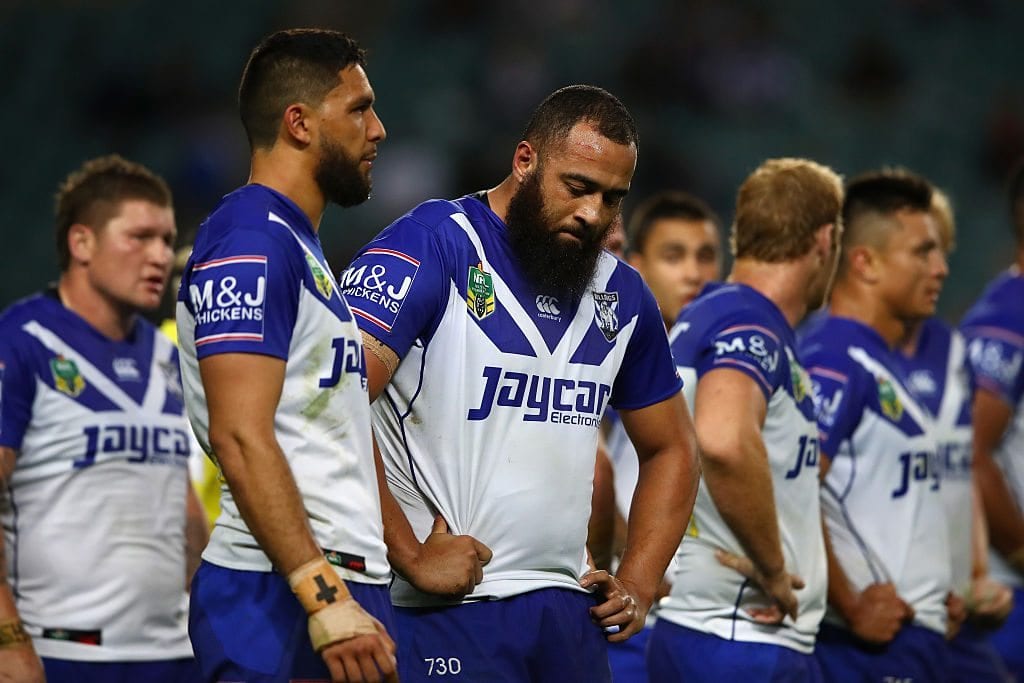"Underachievers" was once not a word used to describe the Canterbury-Bankstown Bulldogs, led by two-time premiership coach Des Hasler.
In 2012 the Bulldogs won the minor premiership and made the Grand Final, where they fell agonisingly short against the vastly more experienced Melbourne Storm.
In 2014, in one of the closest seasons in recent memory, they won their way through teams ranked 2nd, 4th and 6th to sensationally make the Grand Final from 7th, where they were finally undone by the South Sydney Rabbitohs.
But another two years on, and no Grand Final this year. No, the Dogs, most of whom remain from that 2012 decider, ended their season with a fifth straight loss against the far fewer finals tuned Penrith Panthers.
The Doggies’ decline over the past few years has seen them spiral downwards in ever decreasing circles, managing three finals wins in 2014, one last year and none this year.

It’s also seen a plummet in stock for coach Hasler, who created tidal waves on the Northern Beaches when he announced he was leaving the Manly-Warringah Sea Eagles to coach at Belmore.
Hasler’s style, once considered revolutionary and compared to that of the mighty New Zealand All Blacks, has now seemingly reached its’ natural end.
Teams now know how to stop Des’ game plan, and all the big game experience and premiership rings on his fingers will not quell the results nor silence the critics, especially given none of those rings have been won at Belmore.
Sunday’s elimination final was enough to persuade me that the Dessie scepticism was duly warranted.
Not only were the Dogs held to just one try for 77 minutes, but the youthful Panthers ran rings around the usually stern and stingy blue and white wall.
Penrith’s unintuitive lateral running and opportunistic hole hitting, sparked by captain Matt Moylan, left Doggies defenders grasping at thin air, and the situation only got worse with speedster fullback Brett Morris limping off early in the second half.
In an era when NRL defences have typically become impossible to go around, which plays straight into the hands of the big bruising Bulldogs forwards, teams have finally managed to break the mould that they enforce – slow rucks and midfield dominance.
The ‘Desneyland’ style of old is now swiftly being cut apart by new age footy, which focuses on second phase play, more mobile forwards and multiple ball players involved in one movement.
This is not the start and end of the complaints list heard about the Bulldogs, or from their fans, but with the importance of the head coach, it is most certainly right at the top.
This is not to say that Hasler has nothing left to offer in the NRL – if fired by the Dogs, or not renewed beyond 2017, it is most likely another club would snap him up, and would be wise to do so.
But in 2013, the year that splits the Doggies’ two Grand Finals appearances, they finished in the same position on the ladder they did this year and made the same ignominious exit from the competition they did this season.
The fairest assumption of this situation is that Hasler has earned himself the right to see out his contract as head coach, although that may not be the popular opinion.
The Bulldogs have routinely been the third or fourth best team in the competition and have still managed to make it all the way to the last match of the season twice.
Upon arrival, Hasler turned around an old and sluggish team, looking bereft of ideas and commonly dismissed well before the preliminary and Grand Finals.
In fact, many parallels can be made between the 2011 Kevin Moore/Jim Dymock led Dogs, and this years’; a talented playing roster suffering from a coaching hangover, and perhaps more in need of a change than a rebuild, the latter of which some have suggested.
When the Doggies complete their annual season review, does Hasler have anything to answer for? Yes. Plenty.
But the logic-defying results of passed Doggies teams and the coaching talent of the man has earned himself the right to see out his contract, even if to buy the club some time to search for their next leader.
Ultimately, whoever is chosen to replace Hasler, if and when he does leave, it will be a good decision. The Dogs are a class operation and rarely make bad decisions.
It is a club culture that Hasler has helped build up, and one that he should probably depart on his own terms at the end of next season, for the good of his beloved Bulldogs.























Comments are closed.